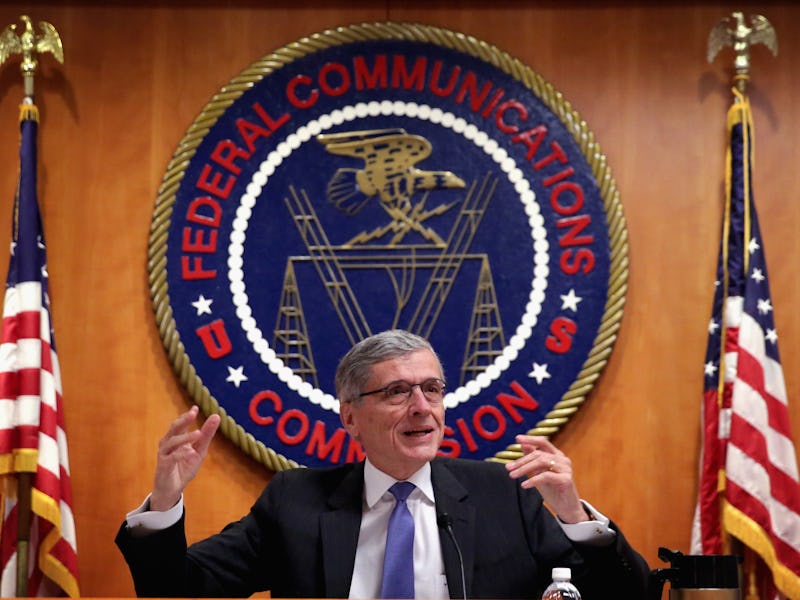What to Expect From FCC's Vote on $9.25/Month Internet Plan
Chairman Tom Wheeler is pushing hard to expand affordable broadband internet access to low-income families, but he’s facing some opposition.

If a U.S. citizen can’t afford private health insurance, there’s medicaid. If they are struggling financially, there are welfare programs. But for those who can’t afford the increasingly necessary resource of broadband internet, there’s nearly nothing.
That’s what the Federal Trade Commission aims to rectify when it takes a vote Thursday to expand its decades-long phone subsidy program, Lifeline, into an affordable broadband program that will deliver internet to eligible low-income families for $9.25 a month.
After a year of planning and public comments, the FCC, with its 3-2 Democratic majority, appears poised to pass the proposal, with some likely vocal opposition from the two Republican commissioners.
FCC Chairman Tom Wheeler, with his increasingly ambitious plans like blowing up the traditional cable box model, points to a number of social and economic benefits of the program, namely hooking up the 43 percent of people who don’t subscribe to broadband today and who cite “affordability” as the reason.
However, there are also some legitimate concerns over budgeting and the history of the program that may have some concerned. Here are some things to look for during Thursday’s meeting.
Computer cables plugged in a server room.
Why the Internet Is Vital
Wheeler will be arguing hard that access to the internet is akin to a human right. While some countries — Estonia for one — have codified getting online as an entitlement, Wheeler likely won’t go quite as far, in fear that it could diminish the budgetary flexibility of the proposed update to the program.
On March 8, in an impassioned argument on the FCC Blog, Wheeler writes that people need internet for all sorts of very important reasons:
“What we’re really talking about is people — unemployed workers who miss out on jobs that are only listed online, students who go to fast-food restaurants to use the wifi hotspots to do homework, veterans who are unable to apply for their hard-earned benefits, seniors who can’t look up health information when they get sick.”
There are stats to back up his claims: seven in ten teachers assign homework assignments that require web access, according to a Pew Research study, and in cities like Detroit, seven out of ten students don’t even have the internet. One-third of American students in K-12 classrooms from low-income and rural households are unable to get online from home.
Wheeler has made it clear he wants to bridge that education and access gap.
Federal Communications Commission Chairman Tom Wheeler (L) and FCC Commissioner Ajit Pai testify before the House Judiciary Committee about Internet regulation.
Paying for a Larger Lifeline
The largest internal criticism of the FCC’s effort to provide affordable broadband have come from Commissioner Michael O’Rielly, who points to wasteful spending on the landline-focused Lifeline in recent years, even as the commission has attempted to revamp and refocus the program on cellular phone coverage.
Advocates of the program revamp once suggested keeping an open budget in order to ensure that everyone who seeks out the program can have phone and broadband internet coverage. However, Wheeler’s proposal wound up taking into consideration some of O’Rielly’s criticisms by setting a budget of $2.25 billion.
That’s significantly higher than the current $1.6 billion budget under which the program operates. But O’Rielly, in an FCC blog post, suggests the budget would need to be set even higher – north of $4 billion – in order to expand the program’s current reach from 40 percent of eligible recipients to all eligible recipients.
Here’s O’Rielly, who asks, “what independence?”
And again — “perfect timing”!
The FCC’s other Republican, Ajit Pai, appeared hopeful this week that the two sides can come to an agreement:
Pai and O’Reilly have noted wasteful spending in the past, and are concerned that issues of fraud could balloon costs. The new proposal does, however, include a provision that requires the commission to reevaluate the budget once spending reaches 90 percent of the set amount.
Given that O’Rielly’s criticisms came just days before his concerns were ostensibly addressed in the proposal, it’ll be interesting to see where the commissioner falls on the final vote and what justification he brings. Pai, on the other hand, is proposing a far smaller budget of $1.75 billion, making it unlikely he’ll support Wheeler’s plan.
In this photo illustration, an error message appears on the Facebook home page on a laptop computer screen on September 28, 2015 in Newark, New Jersey
Those Kids and Their Social Media
A common criticism of the program boils down to something like, “Why is the government spending billions of dollars to allow kids to play around on Facebook?”
Some form of this argument will likely come up during the hearing, and Wheeler, once again, has the numbers to back his arguments. Just consider these stats from Pew:
- 92% of [surveyed] teachers say the internet has a “major impact” on their ability to access content, resources, and materials for their teaching
- 69% say the internet has a “major impact” on their ability to share ideas with other teachers
- 67% say the internet has a “major impact” on their ability to interact with parents, and 57% say it has had such an impact on enabling their interaction with students
Even if kids are using the internet to access Facebook and other social media, it’s clear that this online world has become a vital function of society, and it’s an argument Wheeler will likely make again.
“Internet access has become a prerequisite for full participation in our economy and our society, but nearly one in five Americans is still not benefitting from the opportunities made possible by the most powerful and pervasive platform in history,” Wheeler writes. “We can do better. We must do better.”